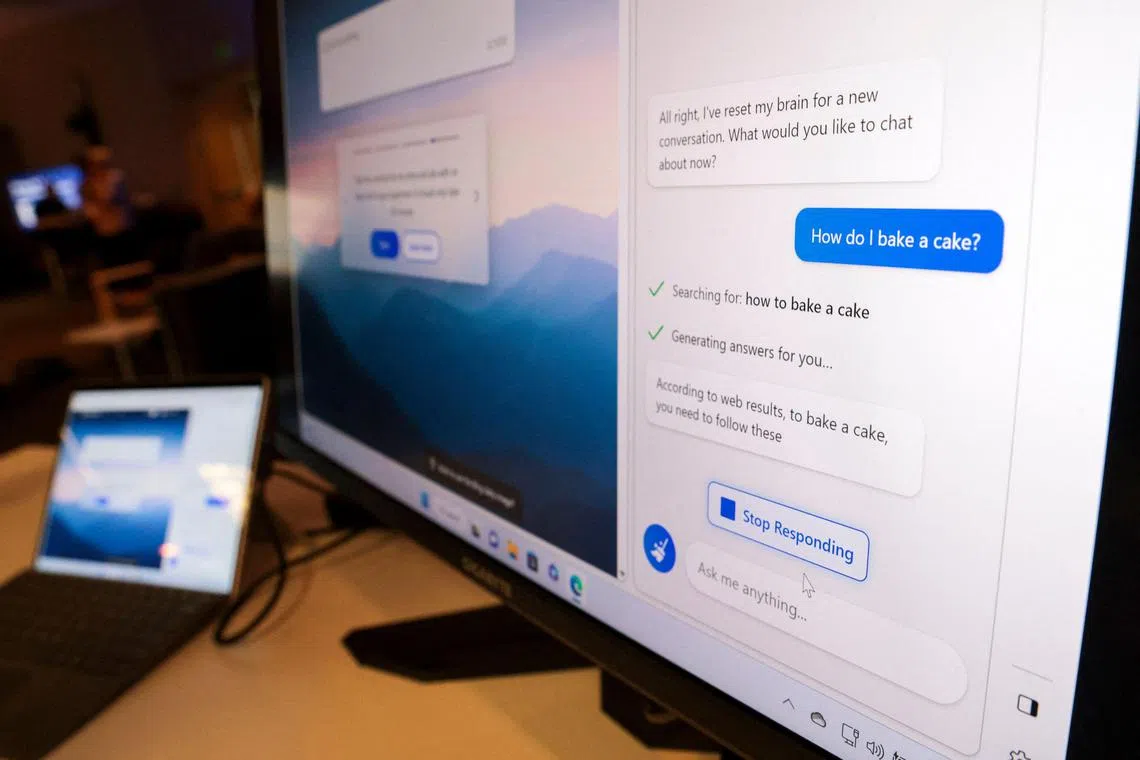Microsoft packs AI into revamped search engine in challenge to Google
Sign up now: Get ST's newsletters delivered to your inbox

New tech race begins: Microsoft unveils its AI-powered Bing search engine at an event on Feb 7, 2023.
PHOTO: AFP
REDMOND, Washington - Microsoft and research lab partner OpenAI on Tuesday unveiled a new Internet search engine and Web browser that use the next iteration of artificial intelligence (AI) technology that many believe could be a key to the tech industry’s future.
This new AI became a fascination for millions of people two months ago when OpenAI released a chatbot called ChatGPT
Microsoft has played catch-up on browsers and badly missed the shift to mobile computing that came with the iPhone, and its Bing search engine is a distant second in popularity to Google.
But it could be the first big company to launch tech’s next big thing if the chatbots and their technology, called generative AI, live up to their billing.
In partnership with OpenAI, Bing will run on a more powerful large language model than the one that underpins ChatGPT. These models are trained on vast troves of online data in order to generate responses to user prompts and queries.
“This technology will reshape pretty much every software category that we know,” said Microsoft chief executive Satya Nadella, adding that “a race starts today in terms of what you can expect”.
On Tuesday, in a room with nearly 100 reporters, editors and photographers, Microsoft showed off a new Bing search engine.
Mr Yusuf Mehdi, a corporate vice-president at Microsoft, used a new conversational interface to search for a 65-inch television set suited to video games. As the service listed television models, he asked it to pare the list to the cheapest ones. It quickly did.
He then used the chatbot to plan a Mexican vacation and research Japanese poets. With a short query, he could ask the system to translate results from Spanish to English or show a particular haiku poem.
Mr Mehdi also unveiled a new version of the company’s Edge browser that offers its own chatbot service. After loading a news release, he asked the bot to summarise the document. He also asked it to write a social media post about the new Bing search engine and had it generate a snippet of computer code for a new software programme.
Microsoft released its new version of Bing to a limited number of people on Tuesday. Each user will be able to run a limited number of queries, and people can join a waiting list for access to the full version of the service. The company plans to expand access to millions more people by the end of February.
Mr Nadella said in an interview that Microsoft was working at a “frantic pace” to incorporate the technology into its products.
By releasing a new search tool – what he called “the most used product on the planet” – people will see how their “everyday habit” could lead to “something magical”.
When it comes to search engines, Microsoft, with just a 3 per cent share of the global market, does not have a lot to lose.
Other companies also have jumped into the chatbot race.
On Monday, Google announced that it would soon offer a chatbot called Bard and start adding chatbot technology into its own search engine.
Meta, Facebook’s parent company, is fast-tracking efforts to release similar technology in various products.
And countless start-ups are building their own generative AI products, the name for technologies that generate words, images and other media on their own.
Microsoft has worked closely with OpenAI, investing US$13 billion (S$17 billion) in the start-up and supplying the billions of dollars in computing power needed to build its AI technology. NYTIMES


